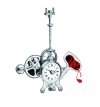
" Nor do I blow my nose... " (1)
The true Potter.
Ricardo Viñes writes, in his private diary, on the 1st of November 1896 :
"They
had
played the Prelude de
Tristan
and, what a coincidence, as I was thinking, terribly moved, that
there was nothing in the world as so sublime and divine as this
Prélude, at that moment, Ravel touched my hand, telling me :
"It is always like that, each time I hear it..." and,
indeed, he who looks so cold and cynical, he, Ravel, the
super-eccentric decadent, Ravel was shaking convulsively and was
crying like a child, but deeply, because spasmodically, tears slipped
out of him. Until now, despite the high opinion I had about Maurice
Ravel's intellectuality, as he is so uncommunicative for the most
little things of his life, I believed that, perhaps, there was a bit
of bias on his part and of elegance in his opinions and literary
taste; but since this afternoon, I see that this man is born with
inclinations, likings and opinions and that, when he expresses them it
is not to look snobbish or to follow fashion, but because he realy
feels them and I
take advantage or this occasion to declare that Ravel is a most
ill-fated and unrecognized being, because he's taken for a failure
whereas he's in fact an intelligence and a superior artist who would
deserve a wondrous destiny. He's, moreover, very complex; there is in
him a mixture of medieval catholic and satanic ungodly, but with also
the love towards Art and Beauty that guides him and makes him feel
ingenuously, as he prooved today, crying at the hearing of the
Prélude de
Tristan et Yseult."
" He had a sense of decency concerning his feelings even more easily offended than Debussy's one. But don't believe that he is devoid of sensibility. On the pretence of his letting nothing to hazard, his carefully
adjusting all his scordes with inimitable meticulousness and precision, one declared that his genius was affected by a kind of dryness. Stravinski was incredibly unfear with him, when he declared that he was nothing but a "Swiss watchmaker". When one condescends, I do not say to listen but to auscultate his Quatuor, the last piece of Ma Mère l'Oye, the final choir of L'Enfant et les sortilèges and all the score of Daphnis et Chloé, one sees that Ravel is emotional and sensible, but his conficences are full of tact and discretion." [I am underlining...]
All that makes an atmosphere where creation was much more difficult than for naive men as Albéric Magnard or Paul Dupin (great artists themselves, and so moving). Ravel lived in a constant desire of the better, in the abhorrence of the "near enough" and of the carelessness, in the fear of that his art lacked this "quality of style" he thought to be a primordial duty of the artist, and the necessary sign of his professionnal honesty of good craftsman (actually, this conception doesn't lack moral elevation; this may have been not enough perceived).
When the resolution of starting to work was taken, of discarding everything else, cloistering himself (not without tiredness, as one can believe), he was getting throug all the obstacles. Often, the music stood up stronger from that inexorable logic, that faultless construction of "perfect watchmaker". But the word watchmaker doe not suit me completely. It refers to the work of a mecanician not to that of a sensible being. You could retort that Ravel was pretending to compose with the sole "reason" ? He knew well that another cause was intervening in, may he had to keep it hidden. He was the first to be hurt by one's writing "I M. Debussy's art is all sensibility, that of M. Ravel is complete insensibility"
"There is no point looking, indiscreetly, any analogy between Ravel and the Potter of Tristan Klingsor. But nowadays everybody admits that he was, sometimes, a sensible man (which is easy to prove by his music)"
(I am underlying...)